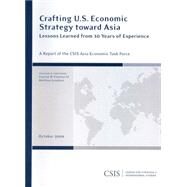Crafting U.S. Economic Strategy toward Asia Lessons Learned from 30 Years of Experience
, by Freeman, Charles W., III; Goodman, Matthew- ISBN: 9780892065547 | 0892065540
- Cover: Paperback
- Copyright: 10/22/2008
Among the many pressing realities that will confront a new U.S. administration in January 2009-whether Republican or Democratic-is the need to manage the challenges and opportunities of a rising Asia. Growing trade and investment flows across the Pacific offer substantial economic benefits to Americans; yet they also create significant risks in both the economic and political spheres. In particular, with the U.S. economy weakened by financial instability and high commodity prices, and Congress more inclined to constrain than embrace globalization, there are a number of potential flashpoints in U.S. economic relations with Asia-from a backlash against high-profile Chinese investments to outrage over tainted children's toys-that could ignite early in a new president's term.The purpose of this report of the CSIS Asia Economic Task Force is to draw out some of the broad lessons learned from three decades of economic policymaking toward Asia and to offer recommendations for managing economic relations with three major countries in the region-China, Japan, and India. The authors focus on these three countries because of their absolute size and/or the growth of U.S. trade and investment with them and because of their domestic political visibility in the United States. The report examines the process of managing economic relations with Asian countries: how the U.S. government should organize itself; how it should approach counterpart governments; how it should communicate with the media, Congress, etc. The authors do not dwell on the substantive questions that arise in those relations-for example, what should our currency policy toward China be; should we discuss energy policy with India; what incentives are needed to persuade Japan to open its agriculture market? Those questions are important and worthy of examination elsewhere. However, process often determines the ultimate effectiveness-or otherwise-of any economic strategy. Therefore, rather than laying out a substantive agenda for policy engagement with Asia, this report is intended to offer the next administration a practical guide to governing in this important policy area.







